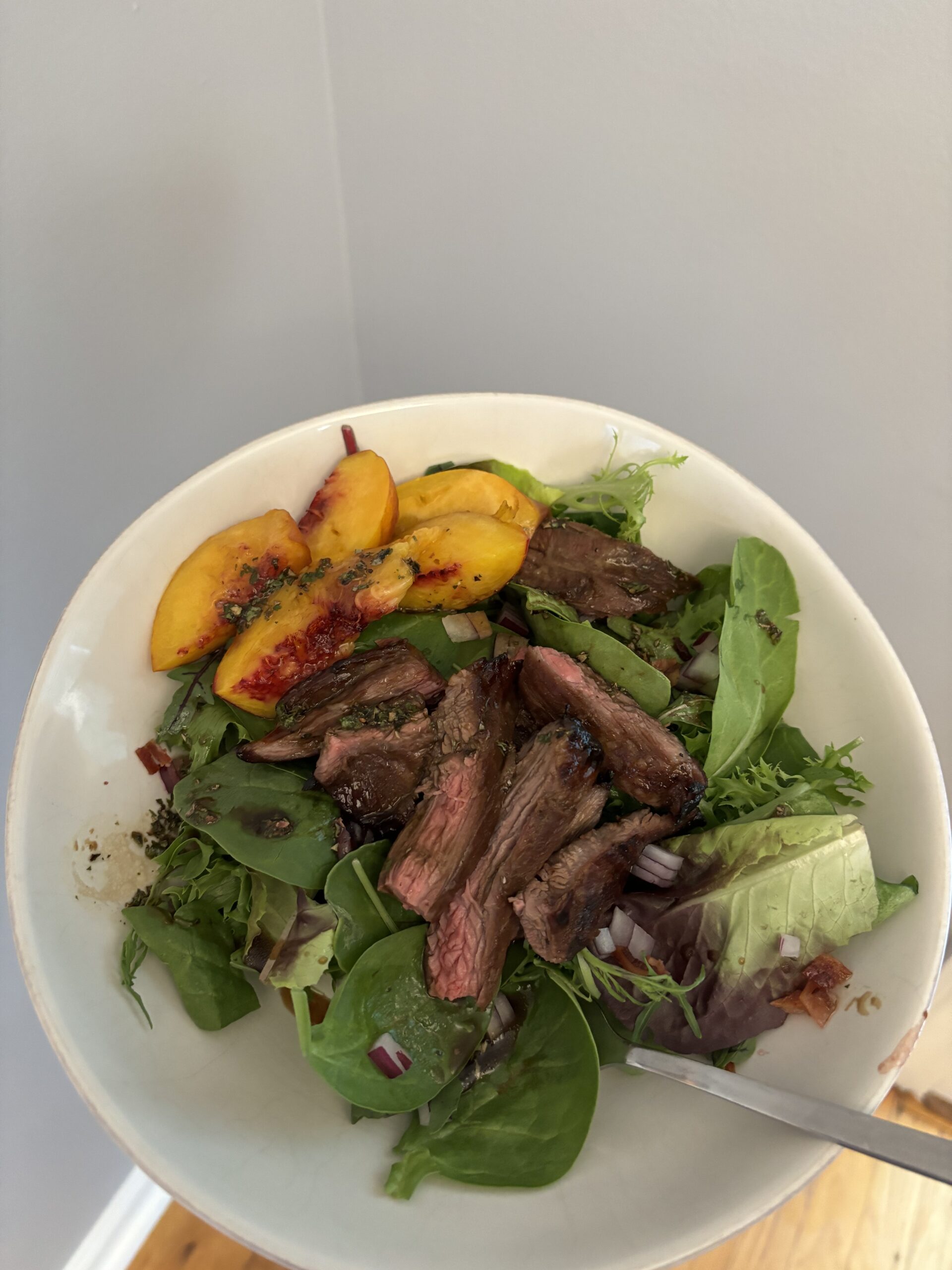Can you claim to care about the environment if you eat meat?
I’m sure you’ve felt the push towards plant-based meals just as I have. It seems like you have to make a mutually exclusive choice. Either you care deeply about the environment, so you obviously choose to be a vegetarian or vegan OR you don’t care about the environment at all and thus eat a diet based on animal products. I don’t think this all-or-nothing approach serves anyone well. There are details and nuances to every topic. It’s important to understand these before making a decision, especially one that can greatly affect your health and well-being. I am not saying my diet choices are the “gold standard” or what everyone else should choose. But I do think my diet choices and environmental stances are outside the norm. My diet choices break the mutual exclusivity that’s often in the media today. Walk with me through my journey to becoming a meat-eating environmentalist!
My early diet choices
I grew up in the 90s and early 2000s. Growing up we generally ate a lot of carbs, with a modest portion of meat once or twice per day. From my memory, I think we almost always had meat at dinner, primarily chicken. We would occasionally have meat at lunch, typically from leftovers or deli meat, and then occasionally for a snack if it was in pizza rolls or some other pre-made food.
My mom purchased most meat from the elementary school Market Day program. Their chicken was the most tender, and that was our primary meat of choice. There was nothing special about it, though – it was conventional meat. My dad is a hunter, so we would also consume deer meat when it was available. My mom didn’t love cooking with venison or beef though. It was relatively rare for us to eat red meat unless it was in a pasta sauce or at a restaurant.
As I went through college, I was not in my healthiest phase of life. My eating habits didn’t change much from growing up, because I didn’t know any different. I ate a lot of carb-heavy meals, but I still ate conventional meat once or twice a day. I didn’t like cooking beef, so I never ate red meat unless I was at a restaurant. While I incorporated some vegetables and fruits in my meals, I typically stuck with what I would consider standards like bananas, apples, and broccoli. I didn’t have a lot of variety in my meals, and I was not feeling my best.
Curiosity about plant-based diets to help the environment
Around the end of 2017, I started to become more health conscious. A huge part of my healthy eating journey centered around Whole30. While there is now a plant-based Whole30 option, there wasn’t when I completed my first Whole30. This elimination diet was primarily based around consuming meat, healthy fats, fruits, and vegetables for 30 days. I really felt my best when I was eating along the Whole30 guidelines. This included animal products at almost every meal.
Once became passionate about the environment a year or two later, I started to consider eating less meat. My research up to that point led me to believe plant-based diet choices have a more positive impact on the environment. As humans, we have an immense, often negative, impact on the earth and its resources. I wanted to do something about it. I convinced my now-husband that we should at least try Meatless Mondays for a month. How were we supposed to make all these other changes to reduce our waste and try to be more responsible about the impact we have on the earth while still eating meat multiple times every day? My understanding was that the world needed more people to eat less meat to decrease emissions and prevent global warming.
Our Meatless Mondays trial
My husband was pretty reluctant at the beginning. I hadn’t started weightlifting at this point, but he was regularly working out and concerned with being able to get enough protein in his diet for his high output. Once I convinced my husband to get on board the Meatless Monday train, we started incorporating vegetarian meals into our meal prep rotation. This led to a little under half of our meals being meatless. It included a full day without meat on Mondays.
Since we had also been using Whole30 or paleo as a dietary guideline, we stuck to vegetarian meals that were as healthy as possible. We prioritized protein like beans, chickpeas, quinoa, etc. and still tried to avoid heavily processed foods. Although dairy is something we had been avoiding, we started incorporating it for a little extra protein and flavor. We were not tracking our macronutrients at the time, but I know we were eating more carbs and less protein than we had been previously.

We found some great plant-based recipes that we enjoyed cooking and consuming. However, we noticed some changes with how we felt overall. When we prioritized more plant-based meals we were hungrier between meals. We also felt more tired, and just didn’t feel like the best version of ourselves. We gave ourselves a few months to get used to the change, but we just didn’t love how eating this type of diet made us feel. This was hard for me to reconcile. There’s so much information out there talking about the health benefits and environmental benefits of eating 100% plant-based.
Digging deeper into the “why”
As I was wrestling through how to manage the discrepancies I was seeing in my life compared to what I thought was supposed to happen, I started searching for more information that was outside of the mainstream sources I had been listening to. I really wanted to know all the details as to WHY plant-based was better. I wanted to get past the surface-level “plant-based is better for the environment and your health” statement. So, I started learning some new things that helped me question the need to be plant-based to live an environmentally friendly and healthy lifestyle. Below I’ll share some blanket statements that are common today, along with the deeper dive and nuance that I have found in my research.
- Cows require too much water to produce. Cows do require a lot of water for each serving of beef produced. However, most of the water they consume is rain water. Fresh water usage is most important to consider, as this is the water also available for human consumption. In fact, almonds require 208 gallons of fresh water to produce 4 ounces whereas beef only requires 33 gallons of fresh water to produce 4 ounces.
- Red meat causes cancer. If you grill red meat, it creates polycyclic aromatic hydrocarbons, which are known to cause cancer. Red meat cooked in a different way does not produce polycyclic aromatic hydrocarbons and thus does not cause cancer. In fact, red meat is one of the most nutrient dense foods available including proteins, essential fatty acids, and vitamins.
- Plants are healthier than animals for human consumption. Plants contain so many different nutrients and it’s considered wise to eat a wide variety of plants for fiber, vitamins, and minerals. However, it’s difficult to get all the nutrients you need from plants. Beef is one of the most nutrient dense foods available. Additionally, if we look at grass-fed compared to conventional beef, grass-fed beef has a lower (i.e. better) ratio of omega-6 to omega-3 fatty acids. While we need both types of fatty acids, the ratio of them is important. Consuming higher quantities of omega-6 fatty acids than omega-3 fatty acids has been found to correlate with cardiovascular and other diseases.
- Cow manure is a huge waste problem that increases greenhouse gas emissions. Animals are important to our ecosystem. Cow manure is a fantastic and natural fertilizer that is used in organic farming. Cow manure, when managed properly, helps keep carbon in the soil rather than the air. It also keeps soil healthy by ensuring soil microbes are active, nutrients are available for plants, soil can retain more water, and soil is not compacting.
- Plant-based diets are more sustainable. Food sources present in a lot of vegan meals like corn and soy are considered monocrops. Monocrops are generally subsidized by the government to ensure they can be produced. They are called monocrops because the same crops are farmed on the same land year after year. Different types of crops require different nutrients to grow and deposit different nutrients in the soil. It is advantageous if you rotate crops from one area to another because it increases the diversity of nutrients in the soil. If only one crop grows in the same soil year after year, the soil becomes depleted of those specific nutrients. Our food in turn becomes depleted of nutrients as well. Due to this loss of nutrients in the soil, it can require greater external inputs like synthetic fertilizers to achieve the same crop at the same yield.
- Plant-based diets are more ethical because no animals are slaughtered. While no animals were directly slaughtered for a plant to show up on your dinner plate, all current farming practices affect creatures like rabbits, mice, spiders, and more which affects the entire food chain. Animals are killed during plant farming practices, they just don’t show up on your plate.
- Cow burps are the cause of high greenhouse gas emissions. Cows burp methane, which is a more potent (meaning more damaging to the environment) greenhouse gas than carbon dioxide. However, methane only lasts in the environment for about 10 years. After that, it breaks down into carbon dioxide and water molecules which plants can then absorb. Prior to 1999, there was a great correlation between the number of ruminant animals (such as cows) and the concentration of methane in the atmosphere. Since 1999, there is no longer a correlation. This is likely because methane is also emitted from fossil fuels, wildfires, and rice farming. So yes, methane is worse for the environment than carbon dioxide. But ruminant animals are designed to be part of nature’s carbon cycle.
- Plant-based diets have a significant and positive impact on the environment. Regenerative agriculture requires the use of animals to be successful. In fact, White Oak Pastures (a regenerative farm in Georgia) beef actually sequesters carbon, meaning it has a negative emissions number. This means eating White Oak Pastures beef is making a positive impact on the environment. White Oak Pasture beef has an even more positive impact than many common plant-based burgers.
- If we don’t transition to plant-based diets, we will never hit our lower greenhouse gas emissions targets. In the United States, agriculture is 3.9% of greenhouse gas emissions, whereas transportation is 28.5% and industry is 21.6%. If instead of focusing on decreasing meat consumption, I focus on driving less with a gas powered vehicle, or decreasing consumption of “stuff” that is manufactured by industry, that will help the environment more than eating a plant-based diet.
Transitioning to a responsibly-sourced, animal-based diet
Once I started learning more, it eased a lot of my concerns with considering myself environmentally conscious while still wanting to consume animal products. My husband and I started prioritizing protein from animal sources again. However, we have started to focus on pasture-raised eggs and poultry along with grass-fed beef rather than conventional. I do think conventional and factory-farmed meat is a huge problem for our health and the environment. But I also realize it may not be practical for everyone to purchase organic, pasture-raised, and grass-fed animal products at all times. And that’s okay too.

Controversy and biases
We can always find ways to reinforce our own personal views and hear only what we want to hear. You could argue that I only researched different views because I didn’t like the way plant-based meals made me feel and I wanted to continue eating meat. And yes, that certainly played into why I started digging deeper. I wanted to understand why my experience didn’t line up with my expectations. If you’ve been following along with Responsible Journey for some time, you know that I love the details! I always try to research views on both sides, and I always try to provide multiple ways that you can make better choices.
I do not believe there is one single diet that will work for every person on the planet. There are multiple options that can be good for your health and the environment. For some people, that includes animal products. And if you are someone who includes animal products in their diet, I hope my journey has inspired you and I hope you are able to find new ways to incorporate animal products in the most environmentally conscious way. For others, maybe that includes being primarily plant-based. If you are someone who eats plant-based and you feel your best, I am cheering you on!! Plants ARE healthy for humans and the environment. However, I also hope you learned something today. I hope you look past the blanket “plant-based is better” statements to dig deeper and truly find the most environmentally conscious options for you and your lifestyle.
Since so much of our culture is pushing that being vegan or vegetarian is the “better” option, we need to acknowledge that the vegan or vegetarian diet choice doesn’t mean you’re automatically a better environmentalist than someone who chooses to eat meat.
You can be an environmentalist AND eat meat!
Again, if you are vegan or vegetarian, I am cheering you on! But since so much of our culture is pushing that being vegan or vegetarian is the “better” option, we need to acknowledge that the vegan or vegetarian diet choice doesn’t mean you’re automatically a better environmentalist than someone who chooses to eat meat. I choose to eat meat because I like it, it helps me reach my protein goals, and I feel vastly better when I incorporate it into my diet. I recognize the environmental impact animal products have, and I choose the best options available based on the knowledge I have.
Just because I eat meat, doesn’t mean I’m not an environmentalist! You don’t have to take an all or nothing approach. Just because some climate change activists on Instagram don’t eat meat, doesn’t mean you have to abstain from animal products. You also don’t have to eat animal products just because some health food functional doctor says a carnivore diet is best for your health. You just have to make the best choice you can with the information you have. Maybe for some people that does include being vegan! But for others it could mean a carnivore or omnivore diet. And it doesn’t make you any less of an environmentalist if that’s the case.
SOURCES:
- “Sacred Cow”, by Diana Rodgers and Robb Wolf
- http://responsiblejourney.com/vegan-vs-carnivore-whats-the-true-impact/







